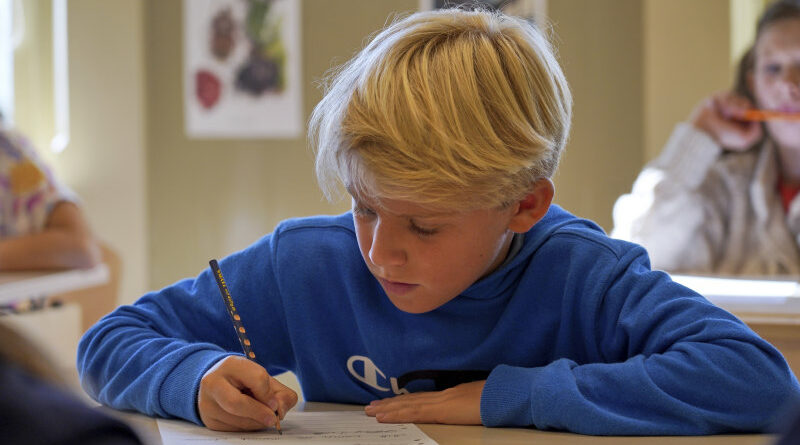Sweden brings handwriting practice, books back to tech-heavy schools
Save articles for later
Add articles to your saved list and come back to them any time.
Stockholm: As young children went back to school across Sweden last month, many of their teachers were putting a new emphasis on printed books, quiet reading time and handwriting practice and devoting less time to tablets, independent online research and keyboarding skills.
The return to more traditional ways of learning is a response to politicians and experts questioning whether the country’s hyper-digitalised approach to education, including the introduction of tablets in nursery schools, had led to a decline in basic skills.
A child practices handwriting at the Djurgardsskolan elementary school in Stockholm, Sweden.Credit: AP
Swedish Minister for Schools Lotta Edholm, who took office 11 months ago as part of a new centre-right coalition government, was one of the biggest critics of the all-out embrace of technology.
“Sweden’s students need more textbooks,” Edholm said in March. “Physical books are important for student learning.”
The minister announced last month in a statement that the government wants to reverse the decision by the National Agency for Education to make digital devices mandatory in preschools. It plans to go further and to completely end digital learning for children under age six, the ministry said.
Although the country’s students score above the European average for reading ability, an international assessment of fourth-grade reading levels, the Progress in International Reading Literacy Study, highlighted a decline among Sweden’s children between 2016 and 2021.
“[Students] need time and practice and exercise in handwriting … before you introduce them to writing on a tablet.”
In 2021, Swedish fourth graders averaged 544 points, a drop from the 555 average in 2016. However, their performance still placed the country in a tie with Taiwan for the seventh-highest overall test score.
In comparison, Singapore – which topped the rankings – improved its PIRLS reading scores from 576 to 587 during the same period, and England’s average reading achievement score fell only slightly, from 559 in 2016 to 558 in 2021.
Some learning deficits may have resulted from the coronavirus pandemic or reflect a growing number of immigrant students who don’t speak Swedish as their first language, but an overuse of screens during school lessons may cause youngsters to fall behind in core subjects, education experts say.
“There’s clear scientific evidence that digital tools impair rather than enhance student learning,” Sweden’s Karolinska Institute said last month on the country’s national digitalisation strategy in education.
Handwriting and printed books are of renewed focus in Swedish schools.Credit: AP
“We believe the focus should return to acquiring knowledge through printed textbooks and teacher expertise, rather than acquiring knowledge primarily from freely available digital sources that have not been vetted for accuracy,” said the institute, a highly respected medical school focused on research.
The rapid adoption of digital learning tools also has drawn concern from the United Nations’ education and culture agency.
In a report published last month, UNESCO issued an “urgent call for appropriate use of technology in education”.
The report urges countries to speed up internet connections at schools, but at the same time warns that technology in education should be implemented in a way so that it never replaces in-person, teacher-led instruction and supports the shared objective of quality education for all.
In the Swedish capital, Stockholm, nine-year-old Liveon Palmer, a third grader at Djurgardsskolan elementary school, expressed his approval of spending more school hours offline.
“I like writing more in school, like on paper, because it just feels better,” he said.
His teacher, Catarina Branelius, said she was selective about asking students to use tablets during her lessons even before the national-level scrutiny.
“I use tablets in math and we are doing some apps, but I don’t use tablets for writing text,” Branelius said. Students under age 10 “need time and practice and exercise in handwriting … before you introduce them to writing on a tablet.”
Criticising the effects of technology is “a popular move with conservative politicians,” Neil Selwyn, a professor of education at Monash University in Melbourne, said. “It’s a neat way of saying or signalling a commitment to traditional values.
“The Swedish government does have a valid point when saying that there is no evidence for technology improving learning, but I think that’s because there is no straightforward evidence of what works with technology.
“Technology is just one part of a really complex network of factors in education.”
AP
Get a note directly from our foreign correspondents on what’s making headlines around the world. Sign up for the weekly What in the World newsletter here.
Most Viewed in World
From our partners
Source: Read Full Article


